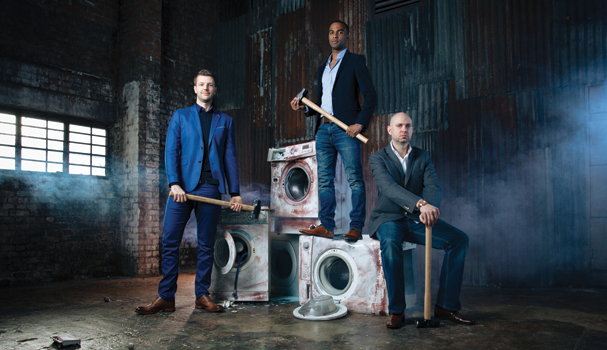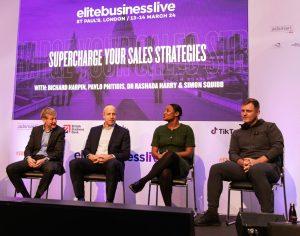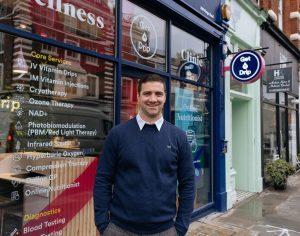Laundry isn’t exactly the most glamorous of trades. Unlike taxis, music, dating or travel, it’s hardly the sort of industry you’d expect to attract a bunch of tech-savvy entrepreneurs eager to make their mark on the world. And yet, as a sector that has scarcely changed in half a century, it’s hard to argue that dry cleaning and laundry isn’t ripe for disruption. Which is why newcomer Laundrapp is looking to make laundry as easy as pressing a button.
When Edward Relf, Laundrapp’s co-founder and CEO, was first approached by Dominic Perks – his future co-founder and Laundrapp’s chairman – with the idea of disrupting of the laundry and dry-cleaning industry, it’s fair to say he had his doubts. “To be blunt, I thought the idea was bonkers,” he says. Having little experience of the sector, he couldn’t be sure how well washing people’s scanties would mesh with cutting-edge tech. But when he took a deeper look at the industry, he saw that it was crying out for a solution that would offer customers a better service. “The opportunity existed to bring in some smart technology and really disrupt the entire space,” he says.
And if there was a man up to the job, it would be Relf. As well as having extensive consultancy and mentorship experience, he has worked for one of the biggest British tech start-ups there is: Mind Candy. “I helped build the Moshi Monsters brand, which blew up into an international kids’ phenomenon,” he says. “By the time I moved on, we had about 80 or 90 million people playing that game across the world.” Laundrapp’s other two co-founders had similarly stellar experience: Antony Pink, the company’s COO, had acted as a strategy consultant for Merrill Lynch and Accenture, whilst CTO Nick Bransby-Williams had previously flexed his developer muscles working in roles for tech start-ups like Badoo and Sooqini.
The trio’s experience made it very easy for them to hit the ground running. “Because of my background in digital entrepreneurship, I had a huge network so I was able to mobilise a team very quickly,” Relf says. The fledgling start-up launched its seed investment round, netting around £1m from angel investors that helped it build a prototype for a small-scale beta test. “The reaction was just outstanding,” he says. “People really bought into what we were doing.”
Part of the reason why consumers have seized upon Laundrapp’s service is that it’s designed to make laundry and dry cleaning as quick and painless as possible. Users simply open up the app, select the items they want cleaned – whether that’s a bag of laundry or a Dior dress – and then choose when and where they want it collected from and delivered to. “As long as we can get a GPS lock, we can basically collect from anywhere,” says Relf. “We even had an instance a few weeks ago where we collected from somebody who was in the middle of a pub quiz.”

And whether you’re getting all your bedding washed or desperately wanting the beer cleaned off your blazer, conscious effort has gone into making the Laundrapp app simple to use. “The consumer-facing part of Laundrapp is beautifully designed; it’s very intuitive and simple to use,” says Relf. However, there is some serious engineering hidden beneath the hood; built into the platform are a whole host of metrics and intelligence tools that keep the service moving. “There’s a lot of sophistication going on behind the scenes,” says Relf.
Part of the reason for this is that logistically Laundrapp is a rather complex business. Whilst the start-up focuses on making things as simple as possible for their users, the reality of washing an entire city’s clobber can be exceedingly complex. “Moving thousands upon thousands of items around London 24/7 in real-time is a huge logistical challenge,” Relf says. To help keep the whole process simple, once the company’s drivers have picked up your clothes they take them to large-scale, industrial facilities that clean on Laundrapp’s behalf. “We manage the consumer touchpoint and our hand-selected partners actually do the processing of the laundry itself,” he says.
But even with the best possible infrastructure in place, there are always surprises that can catch you unawares. “You face so many fascinating daily challenges,” Relf says. Just a few months ago, Laundrapp faced some major disruption to its service when an explosive discovery was made in a neighbouring building site. “They uncovered a second world war bomb literally just across the road from one of our facilities,” he says. “You can imagine the logistical challenge of trying to reroute all of those orders.”
This isn’t the only challenge however: one of the biggest issues facing Laundrapp is altering consumer behaviour. Whilst it is comparatively easy to get users to adapt to an incremental change, completely throwing out established habits is far harder. “At previous businesses, I’ve always launched something that was an iteration of the thing that preceded it,” says Relf. “But, with Laundrapp, we’re trying to move people away from using their washing machine.” Given that using a washing machine is such an engrained habit, tempting consumers away requires a real sea change in the way they expect to access services.
Fortunately, this shift is already under way. The sheer quantity of on-demand start-ups entering the market has set a precedent and increasing numbers of consumers are willing to carry out day-to-day activities through their phone. “There’s a whole raft of companies that offer on-demand services via smartphone apps,” says Relf. Whether you’re looking at Airbnb, Uber, Instacart or TaskRabbit, there are no end of successful start-ups offering anything a consumer could require at the press of a button and this has definitely worked in Laundrapp’s favour. “We’ve found this on-demand, sharing economy has really fuelled our business,” he says.

It does seem that Laundrapp is currently riding the crest of a wave; the way it has been received by the tech community is evidence of just how much confidence there is in the start-up’s success. It launched on January 16 and scarcely more than two months later it had closed a series A round of £4m; serious vindication for such a young company. “You don’t generate £4m of investment if the business isn’t working or the product isn’t resonating,” Relf says.
In addition, word of mouth and promotion on TV is building some serious momentum behind the company; at around 20 weeks old, the start-up is drawing down double-digit week-on-week growth. “People really like what we’re doing; they like our approach, they like the product,” says Relf. “There’s a chance here to actually build this out into one of the UK’s fastest growing and most exciting start-ups.”
Building out its service and capitalising on its position means Laundrapp has some pretty big expansion plans in the offing. Already it has launched in Birmingham and Edinburgh and it has expanded its services to include the whole of Greater London. And whilst Relf doesn’t explicitly mention the next location in the start-up’s sights, it’s clear that it will be looking to add more cities to its network, both at home and abroad. “It’s obvious that at some point in the future rapid international expansion is going to have to be part of the plan,” he says. “But, to be honest, we’ve barely scratched the potential of London yet”
This kind of ambition has fostered comparisons between Laundrapp and Uber, something that Relf is in no rush to contest. “Uber has grown like wildfire,” he says. “It’s absolutely flawlessly executed, it’s a great service and we’re inspired by businesses like that.” Certainly Laundrapp’s trajectory thus far does suggest an almost Uber-esque scaleability; in fact Relf feels the real challenge will be in keeping up with its growth. “It’s a runaway train and we’re holding on for dear life,” he laughs. “But that’s the fun of building start-ups.” ![]()
Share via:


















































